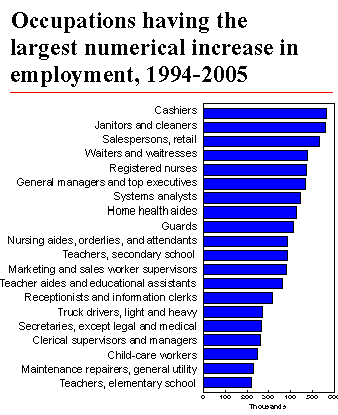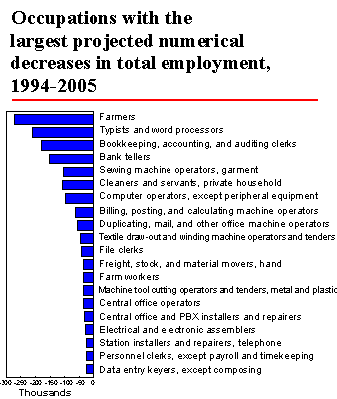


Essential Information on an Essential Issue

Letter No.53
17 January, 1997
World Trade, Jobs and the Environment, by Oxfam's Kevin Watkins.
and Conspiracy of Silence on Global Economy, by Jonathan Eyal.
Peter McCardle's appointment as Minister of Employment wipes away the existing consensus of strategies through which government departments are acting on employment and training issues. NZ First, after all, did not participate in the lengthy multi-party Employment Taskforce process, saying that the Accord was a "sell-out" by Labour and the Alliance that would lead to "continued policy paralysis".
Details remain sketchy on Peter McCardle's new programme of action for his employment portfolio, but it is clear that his plans to re-structure NZES, ETSA and CEG into "one-stop shops" will be revolutionary. The revolution will be in his intention to focus these government services, via regional commissioners, onto regional needs.
Winston Peters says that the employment commissioner concept "foundered" in Wellington ... "as all the Head Office bureaucrats felt threatened that this radical new concept would erode their bureaucratic powers".
Source -- Comments by Vivian Hutchinson. NZ First intentions drawn from pre-election policy releases, speech by Winston Peters in Hastings 14 August 1996
The debate over the minimum wage is hotting up in the new coalition government . The coalition agreed to raise the rate by 10%, from $6.37 to $7 from March 1st. But the new Minister of Labour Max Bradford is careful not to commit himself to plans to further increase the rate in a year's time to $7.50.
Bradford, a former senior official with the Employers' Federation is known to share the federation's view that "higher minimum wages cost jobs". Bradford: "The last thing we want to do is move this way and put people on the unemployment register..."
Source -- New Zealand Herald 26 December 1996 "Showdown over minimum wage"
on proposals to further raise the Minimum Wage
"The real bottom-line here is social -- even moral -- not economic. Wages are what people use to live on. Very low wages mean living on not very much ..."
-- Tim Hazeldine, Professor of Economics at Auckland University.
"What raising the legal minimum wage to $7.50 an hour will actually do is convert many working poor into non-working very poor. Would you prefer to be employed at $6 an hour or unemployed at $7.50 an hour ?"
-- Charles Baird, Professor of Economics at Californian State University, Hayward, and director of the Smith Centre for Private Enterprise Studies, writing on behalf of the Business Roundtable.
"The reality is that some jobs are just not worth much, and if the state seeks to impose an unrealistic pay rate for them, they will disappear. The work will instead be done by other staff in addition to their own tasks, or technological solutions will be used.
"This would be a tragedy. Low-paying jobs are often the first rung on the employment ladder. Frequently those who get them are young adults without school or other qualifications. For them it is a chance to get a foot in the door and from there to progress up the jobs ladder. The danger is that setting a minimum wage which is too high will effectively remove the bottom rung, depriving some people of the chance to climb the ladder..."
-- editorial in The Dominion 27 December 1996 "Minimum better than no pay"
"There are a significant number of employers who have not used the Employment Contracts Act and are not worried about paying more than $7.50 an hour. This is partly a recognition that society is for people, that people are the most valuable assets of such society and that any socio-economic system must be measured by how the people fare in living standards, housing, employment, medical care and education..."
-- Bill Andersen, President of the National Distribution Union.
-- Richard Pearce, engineer and economist, writing in the New Zealand Herald 11 January 1997
The most recent OECD report on the NZ economy predicts that unemployment is unlikely to fall significantly and will continue to run at about 6% for the next two years. This would still make it one of the lowest unemployment rates in the OECD.
The report also says that NZ's return to higher levels of economic growth may be hampered by the Coalition Government's deferral of tax cuts. It says that the first round of tax cuts raised the prospect of a consumer-led recovery, but this would be jeopardised if the second round does not proceed. The OECD had predicted a 2.9% growth rate for 1997 and 1998, based on the expectation of the tax cuts.
Source -- The Dominion 20 December 1997 "Deferring tax cuts may slow economic growth" by NZPA
The Hutt Valley Chamber of Commerce is to publish a booklet of the CV's of all the 70 Feltex workers laid off last month after Alliance Textiles bought their factory. The Chamber will be distributing the booklet to all its members in February. The 'mini curriculum vitaes' will give details of workers' skills, but would not identify them. Potential employers could then contact the Chamber to arrange an interview.
Source -- The Dominion 26 December 1996 "Chamber to help laid-off Feltex workers" by Adam Shelton
Trust Bank in the Bay of Plenty has joined forces with the local NZ Employment Service to help provide about 30 community groups with fully subsidised employees. The Bank's Community Trust has donated $30,000 to help top up the wages of Taskforce Green workers enabling the local community and social service groups in Rotorua, Murupara and Taupo to take on the previously unemployed people. The project also ran last year and created 47 temporary positions in the region.
Source -- Green Dollar Quarterly Summer 1996
The Justice Ministry warns that NZ's obligations under international treaties are limiting the scope of NZ law. In its post-election briefing papers to the incoming coalition government, the ministry says that international treaty negotiations were 'undemocratic' as few NZ'ers were aware of what was being negotiated on these treaties, many of which were binding on NZ.
The ministry says joining international treaties -- such as GATT -- is an 'executive act' involving only ministers and officials. Interested parties might be included, but this is not compulsory. This means international treaties could become binding on NZ without the scrutiny or public participation that legislation in Parliament would receive. As well, many of the treaties that NZ has signed do not have the express power of withdrawal. The Ministry recommends : greater public participation in treaty-making, formal approval in Parliament before any treaty is ratified, a select committee should have a 'watching brief' and reports should be published on the effects and value of treaties to NZ'ers.
see feature on World Trade in this issue
Source -- The Dominion 27 December 1996 "Treaties 'limit' scope of NZ law"
Australia is trying out its own version of the Conservation Corps, but is not restricting access to just the unemployed. In announcing the new environmental projects under the title Green Corps, Environment Minister Robert Hill says that scheme will provide work experience and education for young people, but was not a labour market programme. Joblessness was not a prerequisite to work on the scheme, which will have teams of young people working in groups of ten on environmental projects throughout Australia. The 3-year scheme is being funded at $A41.6m.
Source -- New Zealand Herald 14 January 1997 "Green Corps not just a dole scheme" by AAP
At the beginning of 1996, our Media Watch noted the American press reports of mass sackings by American companies. The New York Times declared that "job apprehension has intruded everywhere, diluting self-worth, splintering families, fragmenting communities, and rubbing salt into the very soul of the country..." As we go into 1997 however, the US economy is trumpeting a continuing stream of job growth. Sure, the large lay-offs are continuing, but the economy is creating many more jobs than it is destroying. The figures: between 1993-1996 the US economy created 8.5 million new jobs.
And the US statistics are also showing that employment growth is being concentrated in jobs paying above median wages, rather than in low-paid service industries such as fast-food outlets.
The Economist: "Downsizing has evolved from being an act of desperation into a calculated choice. The transformation is the result of two trends in management thinking. One is the realisation that size in itself is no longer a competitive advantage ... a fact that has see the humbling of a series of giants from Du Pont and IBM to General Motors. The second is to focus on "core competencies" -- the things that you, and only you can do better than anyone else..."
"Downsizing" has in fact been replaced by "outsourcing", and it is now routine for firms to have their catering, cleaning, security and computer systems run by outside contractors. Economist: "This explains one of the paradoxes at the heart of the downsizing debate; that the total number of jobs in the economy is growing at a time when big companies are laying off people in record numbers..."
Source -- New Zealand Herald 2 January 1996 "Downsizing has become almost forgotten subject" by the Economist
Worsham: "If the job statistics appear bright, why have the headlines been so dismal? Because layoffs and plant closing at big-name corporations become news stories, while the creation of jobs in small firms rarely shows up in daily newspapers..."
Source -- Nation's Business magazine October 1996 "The Great American Jobs Machine" by James Worsham
The US Bureau of Labor Statistics predicts that twenty occupations will account for half of all US job growth until the year 2005. These include several health and education-related occupations. On the reverse side, the twenty most declining occupational areas continue to reflect industry and technological changes in the labour market.
Source -- Occupational Outlook Handbook of the US Bureau of Labour statistics, from their website http://stats.bls.gov:80/ocohome.htm



Top of Page
This Letter's Main Page
Stats |
Subscribe |
Index |
|
The Jobs Letter Home Page |
The Website Home Page
jobs.research@jobsletter.org.nz
The Jobs Research Trust -- a not-for-profit Charitable Trust
constituted in 1994
We publish The Jobs Letter










